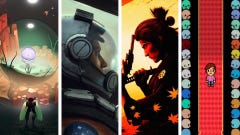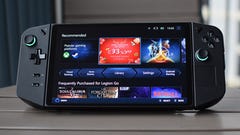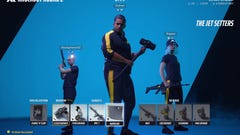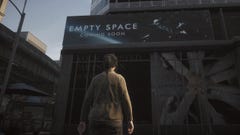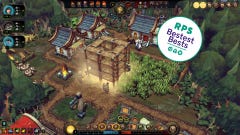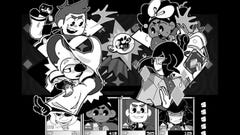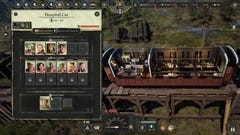Like A Dragon Gaiden: The Man Who Erased His Name review: a rebirth marred by repetition
The colosseum is fantastic, though
When Kiryu's tale "ended" in Yakuza 6, it left me in absolute tatters. A faked death finally saw him freed from the shackles of the yakuza with one big catch: he couldn't ever see his family again. Since then, we've had the plucky Ichiban take on the mantle of Tojo Clan nastiness in Yakuza: Like A Dragon (7), with its sequel Like A Dragon: Infinite Wealth (8) set to wash up on Hawaii's shores next year. What do we know about Infinite Wealth? Kiryu is set to return as a protagonist alongside Ichiban, with an all-new haircut. And more importantly, what has Like A Dragon Gaiden got to do with any of this? Well, it's a shorter stop-gap between the events of Yakuza 6 and Yakuza 8 that fills us in on what Kiryu's been up to this whole time.
But aside from moreish minigames and a fantastic Agent persona with web-slinging abilities, Kiryu's epilogue is a far cry from Yakuza's best stories. By no means is it bad, it just isn't the best introduction to the series for newcomers, and even longtime fans will struggle balancing his resurrection with its heavy feelings of repetition.
Since his "death", Kiryu now works as an agent of the ruthless Daidoji faction having adopted a new codename Joryu. Kiryu does their dirty work and they keep him in the shadows with a roof over his head… and a knife nestled in his spine. Of course, Kiryu gets caught up in a shady Daidoji deal that steers itself towards an unsurprising truth: wahey, the yakuza are involved! For newcomers, brief flashbacks to Yakuza 6's ending and some references to LAD help add a smidge of context to Kiryu's story so far. But as someone who's played every Yakuza game, Gaiden feels like a rebirth that can't capitalise on Kiryu's turbulent past as a clan leader and father figure (see also: fishing legend, taxi driver king, the list goes on).
Sure, throughout Gaiden's story newcomers will come to grasp Kiryu's legacy through doing - a.k.a. pounding a gang of goons into the concrete with a Raleigh bicycle. And as factions double-cross each other you'll learn - or be reminded of - Kiryu's values. All of it, though, is wrapped up in a tale that's lightweight by design and lacks much of what makes a mainline Yakuza story soar. There's certainly a sense of tension that separates it from the rest of the series here, as your main squeezes aren't afraid to ditch the chummy pats on the back for a crack of the handler whip at any moment. But your involvement in it all is backed by such a loose threat that you're never convinced will actually materialise. Don't expect it to build a sense of community or turn to deep family ties, for example. More importantly, though, it never finds any real reason why Kiryu should be making this kind of comeback.

While there's some classic setpieces, like busting through multiple office floors and clattering lads with sofas, Gaiden has Kiryu solve almost every problem with his fists. Before you come at me with, "But isn't that Yakuza?!", I'd argue that it's not, actually. In streamlining Gaiden as a stop-gap, it's portrayed Kiryu - and the series as a whole, actually - as simplistic to newcomers and as a step back for longtime fans.
Early on, for example, you'll meet the plucky Akame, an information broker who grants you access to the Akame Network, a set of side missions and minor fetch quests that'll grant you money and Akame Points. These replace Yakuza's traditional side missions that kickstart when you cross paths with people, and act a bit like the side cases in Yakuza spin-off Judgment. Again, many of these are fun additions that offer a breather from the story, but they lack the usual emotional weight or bonkers twists of the rest of the series. And they always race to a conclusion, and that conclusion is always a fight. Guaranteed.
Gone is the nice balance between Kiryu having to carry multiple ice cream cones across a busy intersection without getting obliterated by a Toyota, and then, like, engaging in a faction war. There's no pretending to be a film director by making snap decisions on whether to "Get Goofy" or not, or guiding a bubble-covered man from a bathroom stall to a clothes store, all while dodging pools of water. For me, this is what really makes a Yakuza game, and without it Gaiden can't help but feel rather diminished by comparison.
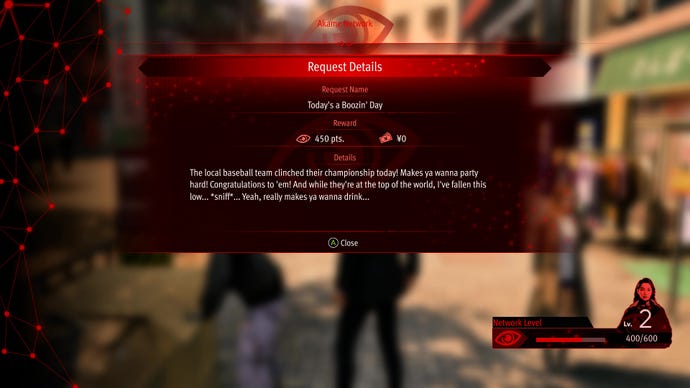
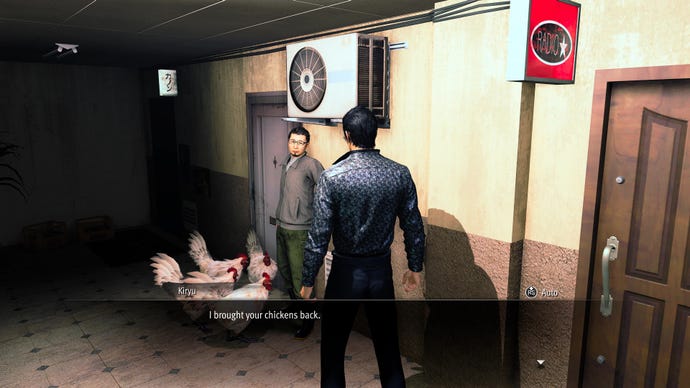
That said, I do reckon Gaiden's streamlining has ended up lending its main side activities some extra weight at the same time, not to mention giving you an easier route into making big bucks. Money and Akame Points can be poured into upgrading Kiryu's abilities or buying parts for your Pocket Circuit Racers or financing horny chats with hostesses. Money flows easily in Gaiden, which makes it easy to get hooked on grinding out Akame's missions and investing in your favourite things, one of my faves being on a dodgy boat.
Nestled in the centre of a gigantic barge is the Castle (Ed: excuse me, sir...). Fans will draw immediate comparisons to the series' Purgatory - a hub of flashing lights and debauchery, home to a casino, a gambling hall, carts pulled by actual humans, and the colosseum. It's here where I spent a frankly unhealthy amount of time. Some of it was mandated by the main story, but most of it was off my own back because it made my brain feel fuzzy and transformed fights into dream sequences I never thought would happen in a Yakuza game. Aside from the usual ranked matches where you climb from bronze to gold and so on, it has a mode where you can build an army of up to 10 fighters and fight alongside them in chaotic battles.
I cannot tell you how exciting it was to level up my old friends Majima and Taiga. To recruit cult leaders from the past that would heal my pals! To earn enough money to get introduced to Chicken Man and watch him draw an uzi from his pocket and drop an entire squad of goons by himself! Complete an Akame quest and you can unlock Saito and his bro from Judgment, then see them in the fighter's lounge chilling pre-fight. Seriously, you can even play as any of these fan-faves, and it's all driven by earning money, earning levels, and upping your Akame Points. Everything feeds into everything neatly, meaning you always feel like you're progressing towards earning new ranks and, excitingly, special fights where you eventually earn the right to take on The Four Kings of the Colosseum. Yes, it's mostly fan service, and yes, it's a shame it's not at all related to the main story, but what can I say? Here, Yakuza's big, weird beating heart does live on in some respect.
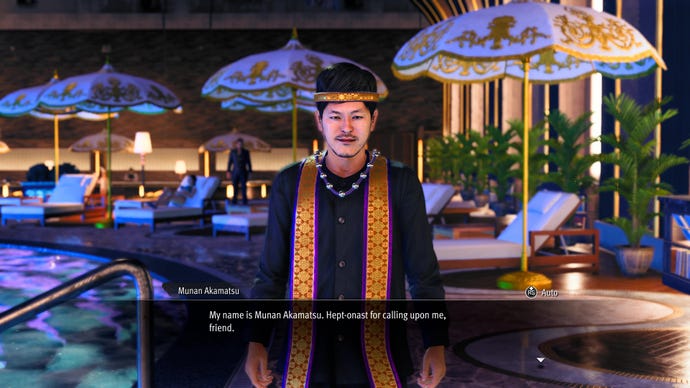


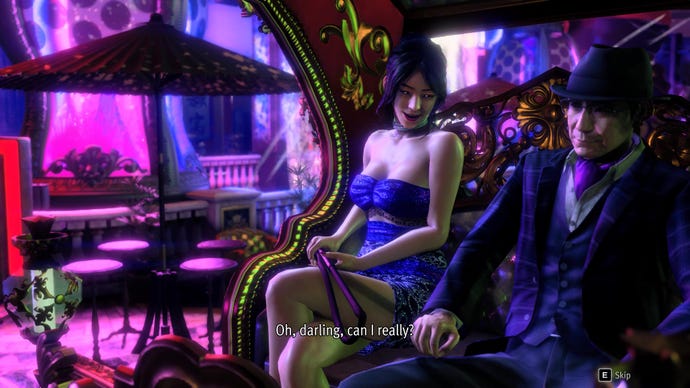
Similarly, as much as I do think there's too much fighting in Gaiden, I can't say I ever got bored by Kiryu's new Agent fighting style (the other being his usual Yakuza slug fest). Lots of battles take place on a bigger scale here with loads of goons, Colosseum included, and Agent feels built to tackle them with style. It's a bit James Bond-meets-very-buff-Spider-Man, where you've got wires you can project from your hands that can hold loads of them in place, or send them flying with a quick flick of the wrist. Chuck cigarettes on the floor and they'll act like bombs, while holding down the sprint button will activate your rocket shoes. Pile into enemies with jets ejecting from your Oxfords and they'll tumble like skittles.
I'd say the web-slinging Spider gadget is the best of the bunch, as the others aren't quite as impactful on their own. Use them all in quick succession, however, and they're a good laugh combined with Agent's snappier, more technical punches and kicks. It gives the impression that Kiryu's honed a "Don't even try it" style of his own over the many years he's battered lads on the street.
Ultimately, though, great Colosseum fights, sometimes funny Akame missions, and occasional story wins can't quite make up for Like A Dragon Gaiden feeling like a hurried excuse to resurrect Kiryu. Yes, it ties into his upcoming role in Like A Dragon: Infinite Wealth and it's lovely to be in his shoes again, but the story pales in comparison to previous offerings. Motoring between endless fights in the game's story doesn't represent what Yakuza stands for, and throughout I couldn't help but wrestle with the idea that it might be erasing not just Kiryu's own name, but the series' wider legacy.
This review is based on a review build of the game provided by publishers Sega.






